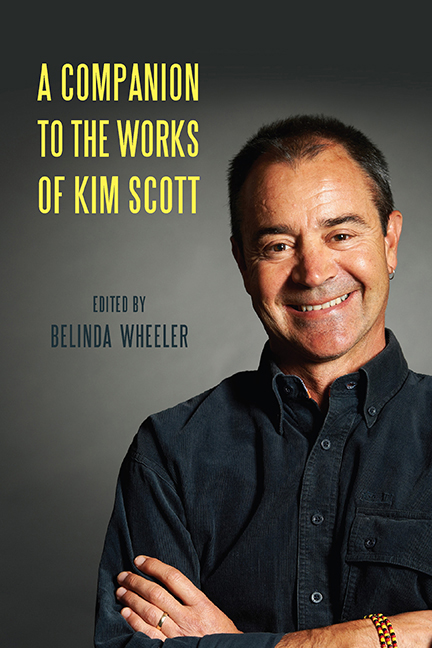Book contents
- Frontmatter
- Contents
- Foreword
- Acknowledgments
- Note on Orthography
- Chronology of Key Writings
- Introduction
- 1 Kim Scott’s Publishing History in Three Contexts: Australian Aboriginal, National, and International
- 2 Kim Scott’s True Country as Aboriginal Bildungsroman
- 3 The Land Holds All Things: Kim Scott’s Benang—A Guide to Postcolonial Spatiality
- 4 Kim Scott’s Kayang and Me: Noongar Identity and Evidence of Connection to Country
- 5 “Wreck/Con/Silly/Nation”: Mimicry, Strategic Essentialism, and the “Friendly Frontier” in Kim Scott’s That Deadman Dance
- 6 The International Reception of Kim Scott’s Works: A Case Study Featuring Benang
- 7 Traumatic Landscapes: Inscribing Spectrality and Identity in Kim Scott’s “A Refreshing Sleep,” “Capture,” and “An Intimate Act”
- 8 Spatial Poetics and the Uses of Ekphrasis in Kim Scott’s “Into the Light” and Other Stories
- 9 The Poetry of Kim Scott
- 10 The Wirlomin Project and Kim Scott: Empowering Regional Narratives in a Globalized World of Literature
- 11 Kim Scott as Boundary Rider: Exploring Possibilities and New Frontiers in Aboriginal Health
- 12 An Interview with Kim Scott
- Notes on the Contributors
- Index
Introduction
Published online by Cambridge University Press: 08 May 2021
- Frontmatter
- Contents
- Foreword
- Acknowledgments
- Note on Orthography
- Chronology of Key Writings
- Introduction
- 1 Kim Scott’s Publishing History in Three Contexts: Australian Aboriginal, National, and International
- 2 Kim Scott’s True Country as Aboriginal Bildungsroman
- 3 The Land Holds All Things: Kim Scott’s Benang—A Guide to Postcolonial Spatiality
- 4 Kim Scott’s Kayang and Me: Noongar Identity and Evidence of Connection to Country
- 5 “Wreck/Con/Silly/Nation”: Mimicry, Strategic Essentialism, and the “Friendly Frontier” in Kim Scott’s That Deadman Dance
- 6 The International Reception of Kim Scott’s Works: A Case Study Featuring Benang
- 7 Traumatic Landscapes: Inscribing Spectrality and Identity in Kim Scott’s “A Refreshing Sleep,” “Capture,” and “An Intimate Act”
- 8 Spatial Poetics and the Uses of Ekphrasis in Kim Scott’s “Into the Light” and Other Stories
- 9 The Poetry of Kim Scott
- 10 The Wirlomin Project and Kim Scott: Empowering Regional Narratives in a Globalized World of Literature
- 11 Kim Scott as Boundary Rider: Exploring Possibilities and New Frontiers in Aboriginal Health
- 12 An Interview with Kim Scott
- Notes on the Contributors
- Index
Summary
KIM SCOTT (1957–), a leading force in Australian Aboriginal literature, Australian literature, and world literature, has won nearly every Australian literary award, including Australia's highest literary prize, the Miles Franklin Award, twice (in 2000 for his novel Benang [1999] and in 2011 for That Deadman Dance [2010]). Other Australian awards Scott has won include the ALS Gold Medal, the Australian Centenary Medal, the Kate Challis RAKA Award, the Victorian Premier's Prize, the Western Australian Premier's Book Award, the Adelaide Festival Award for Literature, the Matilda Award, and the New South Wales Premier's Literary Prize. Outside of Australia, Scott has won the Commonwealth Writers’ Prize for the best book in Southeast Asia and the Pacific (That Deadman Dance), and his work has been long-listed twice for the Dublin IMPAC Literary Award (Benang and That Deadman Dance), to name but a few of his international accolades.
Scott grew up during an important moment in Australia's history. Born in Midland, Western Australia, Scott was five years old when Australian Aboriginals were allowed to vote for the first time under an amended Commonwealth Electoral Act. Not until Scott was seven, in 1964, was the first book of poetry by an Australian Aboriginal published, Oodgeroo Noonuccal's We Are Going. That same year the Aboriginal Studies Press was established as part of AIATSIS (Australian Institute of Aboriginal and Torres Strait Islander Studies), but it was thirteen years (1977) before the press would publish its first book written by an Australian Aboriginal, Jimmie Barker's The Two Worlds of Jimmie Barker: The Life of an Australian Aboriginal, 1900–1972. When Scott was approximately ten, a national referendum in 1967 permitted Australian Aboriginals to be counted as part of the national census for the first time. In 1975, when Scott was a teenager, Australia's federal parliament passed the Racial Discrimination Act, an act that was designed to “ensure that people of all backgrounds are treated equally and have the same opportunities” and to “make discrimination against people on the basis of their race, colour, descent or national or ethnic origin unlawful” (“Race Discrimination”). Although there were arguably great strides being made nationally for Australia's first inhabitants during Scott's childhood and early adulthood, more needed to be done.
- Type
- Chapter
- Information
- A Companion to the Works of Kim Scott , pp. 1 - 8Publisher: Boydell & BrewerPrint publication year: 2016



